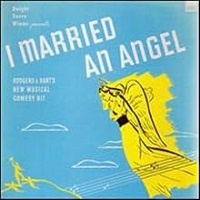 Original Broadway Cast Members and Radio Cast, 1985 (AEI Records)
Original Broadway Cast Members and Radio Cast, 1985 (AEI Records)  (4 / 5) I Married an Angel is a gem from the collection of Richard Rodgers and Lorenz Hart. Admittedly, it’s a slight musical; the plot concerns Count Willy Palaffi, who breaks off his engagement, stating that he will only “marry an angel.” Indeed, one flies down from heaven — complete with wings — and Willy learns to be careful what he wishes for. The only songs with a clear connection to the plot are the title song and “Angel Without Wings,” which consists mostly of rhyming dialogue. All the same, Rodgers and Hart supply a few lovely numbers that make this score a necessity for any musical theater fan. The highlight may be “A Twinkle in Your Eye,” a delightfully amoral ode to cheating and the ways that clever women can stay out of trouble, performed with vivacious flair by Wynn Murray. A wistful ballad, “Spring is Here,” also stands out, and it showcases the unique vocal quality of Eve Symington. The makeup of this album is unusual: It features six selections performed by members of the original Broadway cast and recorded by the Liberty Music Shop in 1938, plus a medley-cum-overture, played by popular pianists Cy Walter and Gil Bowers, that serves as the opening track. The five remaining numbers are taken from a 1952 radio production that starred the silver-voiced Gordon MacRae and the charming Lucille Norman. While both sets of excerpts are sung and orchestrated beautifully, this inconsistency makes the recording feel like it presents a series of musical vignettes rather than a complete score. But with music as good as this, why ask for anything more? — Charles Kirsch
(4 / 5) I Married an Angel is a gem from the collection of Richard Rodgers and Lorenz Hart. Admittedly, it’s a slight musical; the plot concerns Count Willy Palaffi, who breaks off his engagement, stating that he will only “marry an angel.” Indeed, one flies down from heaven — complete with wings — and Willy learns to be careful what he wishes for. The only songs with a clear connection to the plot are the title song and “Angel Without Wings,” which consists mostly of rhyming dialogue. All the same, Rodgers and Hart supply a few lovely numbers that make this score a necessity for any musical theater fan. The highlight may be “A Twinkle in Your Eye,” a delightfully amoral ode to cheating and the ways that clever women can stay out of trouble, performed with vivacious flair by Wynn Murray. A wistful ballad, “Spring is Here,” also stands out, and it showcases the unique vocal quality of Eve Symington. The makeup of this album is unusual: It features six selections performed by members of the original Broadway cast and recorded by the Liberty Music Shop in 1938, plus a medley-cum-overture, played by popular pianists Cy Walter and Gil Bowers, that serves as the opening track. The five remaining numbers are taken from a 1952 radio production that starred the silver-voiced Gordon MacRae and the charming Lucille Norman. While both sets of excerpts are sung and orchestrated beautifully, this inconsistency makes the recording feel like it presents a series of musical vignettes rather than a complete score. But with music as good as this, why ask for anything more? — Charles Kirsch
All posts by Michael Portantiere
The Great Gatsby
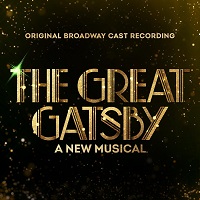 Original Broadway Cast, 2024 (Sony Masterworks Broadway)
Original Broadway Cast, 2024 (Sony Masterworks Broadway)  (0.5 / 5) As F. Scott Fitzgerald’s famous and revered novel The Great Gatsby lapsed into the public domain, it was perhaps inevitable that stage adaptations would begin to appear. This musical version had the good fortune of employing two extremely talented vocalists, Jeremy Jordan (Newsies, Bonnie and Clyde, etc. ) as Jay Gatsby and Eva Noblezada (Miss Saigon, Hadestown) as Daisy Buchanan. Noblezada was cast against type for this role, yet she comes across better than Jordan on the recording, finding genuine emotion in songs such as “For Better or Worse” and “Beautiful Little Fool.” Though Jordan’s singing voice is distinctive in ballads including “For Her,” his accent in his spoken dialogue sounds out of place. And while John Zdrojeski and Sara Chase are well cast as Tom Buchanan and Myrtle, respectively, Noah Ricketts struggles in the role of Nick. The story of Gatsby’s pursuit of the married Daisy is narrated in the novel and the musical by Nick, who has just returned home from serving in World War I, and who also plays a key role in the unfolding drama as he carries on a romance with professional golfer Jordan Baker (Samantha Pauly). Nick is the audience’s reporter on the show’s primary subjects and themes: the tragedy hidden behind the decadence of the Roaring ’20s in America, the life of the mysterious Gatsby, and the everlasting hope or the unreachable dream represented by a single green light in the distance. But narration is much more difficult to execute in a stage show than in a novel, and Nick’s lines often feel shoehorned into the musical. The score for this adaptation was written by Jason Howland (music) and Nathan Tysen (lyrics), and the book by Kait Kerrigan. Howland is not untalented; his melodies for the songs “For Her,” “Only Tea,” and “Past is Catching Up to Me” are enjoyable, and “My Green Light” plays well as the obligatory, highly-anticipated duet between the two leads. But some of Tysen’s lyrics are of shockingly poor quality. For example, in the song “One-Way Road,” a pregnant Myrtle sings “Though I’m not showing, a baby’s growing,” along with “He’s mine, and this baby here is genuine.” Lyrics like these prevent the recording from gaining any real momentum, and further, the score as a whole is structured so generically that some listeners may be able to predict the type and style of each successive song before it plays. Although the standout visuals of this show’s physical production and the presence of two bankable musical theater notables may keep the party moving well enough on stage, this Great Gatsby‘s lack of nuance is clear from the cast album, especially in comparison to the source material. — Forrest Hutchinson
(0.5 / 5) As F. Scott Fitzgerald’s famous and revered novel The Great Gatsby lapsed into the public domain, it was perhaps inevitable that stage adaptations would begin to appear. This musical version had the good fortune of employing two extremely talented vocalists, Jeremy Jordan (Newsies, Bonnie and Clyde, etc. ) as Jay Gatsby and Eva Noblezada (Miss Saigon, Hadestown) as Daisy Buchanan. Noblezada was cast against type for this role, yet she comes across better than Jordan on the recording, finding genuine emotion in songs such as “For Better or Worse” and “Beautiful Little Fool.” Though Jordan’s singing voice is distinctive in ballads including “For Her,” his accent in his spoken dialogue sounds out of place. And while John Zdrojeski and Sara Chase are well cast as Tom Buchanan and Myrtle, respectively, Noah Ricketts struggles in the role of Nick. The story of Gatsby’s pursuit of the married Daisy is narrated in the novel and the musical by Nick, who has just returned home from serving in World War I, and who also plays a key role in the unfolding drama as he carries on a romance with professional golfer Jordan Baker (Samantha Pauly). Nick is the audience’s reporter on the show’s primary subjects and themes: the tragedy hidden behind the decadence of the Roaring ’20s in America, the life of the mysterious Gatsby, and the everlasting hope or the unreachable dream represented by a single green light in the distance. But narration is much more difficult to execute in a stage show than in a novel, and Nick’s lines often feel shoehorned into the musical. The score for this adaptation was written by Jason Howland (music) and Nathan Tysen (lyrics), and the book by Kait Kerrigan. Howland is not untalented; his melodies for the songs “For Her,” “Only Tea,” and “Past is Catching Up to Me” are enjoyable, and “My Green Light” plays well as the obligatory, highly-anticipated duet between the two leads. But some of Tysen’s lyrics are of shockingly poor quality. For example, in the song “One-Way Road,” a pregnant Myrtle sings “Though I’m not showing, a baby’s growing,” along with “He’s mine, and this baby here is genuine.” Lyrics like these prevent the recording from gaining any real momentum, and further, the score as a whole is structured so generically that some listeners may be able to predict the type and style of each successive song before it plays. Although the standout visuals of this show’s physical production and the presence of two bankable musical theater notables may keep the party moving well enough on stage, this Great Gatsby‘s lack of nuance is clear from the cast album, especially in comparison to the source material. — Forrest Hutchinson
The Connector
 Original Off-Broadway Cast, 2024 (Concord Theatricals)
Original Off-Broadway Cast, 2024 (Concord Theatricals)  (3.5 / 5) Teeming with interesting ideas about ethics, journalism, the generation gap, and sexism, The Connector presents its audience with a key question: Would you rather read the facts, or the “truth?” Daisy Prince was a major creative force behind the show, which she directed Off-Broadway in early 2024. Jason Robert Brown provided the music and lyrics, and Jonathan Marc Sherman wrote the book. All three were inspired by the true stories of Stephen Glass and Jayson Blair, who respectively duped The New Republic and The New York Times into publishing articles that were partly fabricated or, in some cases, completely false. Ben Levi Ross leads the company as Ethan Dobson, the charismatic but duplicitous reporter at the center of the story, and his vocal talent is one of the greatest strengths of this recording. He is matched by Hannah Cruz in the role of Robin Martinez, a fellow journalist who quickly becomes suspicious of Ethan’s articles. Also on hand are stage veterans Scott Bakula and Jessica Molaskey, paired well with the newcomers. Bakula plays the jaded editor in chief of The Connector, and his wry rendition of the song “Now What?” reflects the divide between the older and younger generations; Molaskey is wonderful as the magazine’s longest-tenured fact checker, the first member of the staff to see through Ethan’s facade. In a humorous role, Max Crumm plays the subject of one of the fabricated articles, a West Village hustler whose game of choice is Scrabble. The show’s writers have given the cast powerful material in songs such as “Proof,” “The Western Wall,” and “There Never Was.” Brown’s score is appropriately varied and tuneful, and certainly reflective of the show’s setting in the 1990s; if it’s not as catchy as some of his previous work, his lyrics will be sure to stick with listeners and make them think. The final song is haunting as it derides the ethics of modern journalism and the gullible nature of the public with the searing line: “We believe what we believe, and all we want is someone to confirm it.” In the age of “fake news,” “alternative facts,” and unregulated online information sources, this recording is a timely listen. — Forrest Hutchinson
(3.5 / 5) Teeming with interesting ideas about ethics, journalism, the generation gap, and sexism, The Connector presents its audience with a key question: Would you rather read the facts, or the “truth?” Daisy Prince was a major creative force behind the show, which she directed Off-Broadway in early 2024. Jason Robert Brown provided the music and lyrics, and Jonathan Marc Sherman wrote the book. All three were inspired by the true stories of Stephen Glass and Jayson Blair, who respectively duped The New Republic and The New York Times into publishing articles that were partly fabricated or, in some cases, completely false. Ben Levi Ross leads the company as Ethan Dobson, the charismatic but duplicitous reporter at the center of the story, and his vocal talent is one of the greatest strengths of this recording. He is matched by Hannah Cruz in the role of Robin Martinez, a fellow journalist who quickly becomes suspicious of Ethan’s articles. Also on hand are stage veterans Scott Bakula and Jessica Molaskey, paired well with the newcomers. Bakula plays the jaded editor in chief of The Connector, and his wry rendition of the song “Now What?” reflects the divide between the older and younger generations; Molaskey is wonderful as the magazine’s longest-tenured fact checker, the first member of the staff to see through Ethan’s facade. In a humorous role, Max Crumm plays the subject of one of the fabricated articles, a West Village hustler whose game of choice is Scrabble. The show’s writers have given the cast powerful material in songs such as “Proof,” “The Western Wall,” and “There Never Was.” Brown’s score is appropriately varied and tuneful, and certainly reflective of the show’s setting in the 1990s; if it’s not as catchy as some of his previous work, his lyrics will be sure to stick with listeners and make them think. The final song is haunting as it derides the ethics of modern journalism and the gullible nature of the public with the searing line: “We believe what we believe, and all we want is someone to confirm it.” In the age of “fake news,” “alternative facts,” and unregulated online information sources, this recording is a timely listen. — Forrest Hutchinson
Lempicka
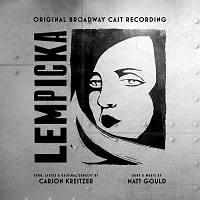 Original Broadway Cast, 2024 (Sony Masterworks Broadway)
Original Broadway Cast, 2024 (Sony Masterworks Broadway)  (1 / 5) Fans hailed Eden Espinosa’s return to Broadway in Lempicka and fawned over pre-released songs from the score, such as “Woman Is,”’ that showed off her powerful vocal instrument. Unfortunately, the show was a dud — an unfocused and unpleasant musical that appeared to be far more interested in the soap opera aspects of the title character’s life than her art. First-time listeners to this cast recording might be taken aback by the techno music and harsh orchestrations used in the overture, especially if they have any background knowledge about the show’s subject: Polish painter Tamara de Lempicka, whose most notable works were completed in the 1920s and ’30s in the Art Deco style, of which she was a pioneer. Composer Matt Gould seems to have written electronic music with rhythmic, focused beats for this score as a way of reflecting the hard-edged style of Lempicka’s art. Perhaps this is justifiable for the numbers in which Lempicka is learning to paint and developing her style, but as the show’s plot proceeds, and both her marriage and her extra-marital affair begin to fall apart, the emotional turmoil is accompanied by jarringly upbeat music more fit for a dance club. Espinosa impressively belts her way through the mediocre material, and two other pluses of the album are the textured, beautiful voices of Amber Iman and Andrew Samonsky as, respectively, Lempicka’s muse/lover and her husband, the latter doing his best with the show’s most poorly written character. These three share a love triangle that takes up most of the focus in the overstuffed plot and score. Lempicka closed very quickly on Broadway, and this recording seems unlikely to become a treasured cast album of a flop. A final note: Beth Leavel in the role of The Baroness gets one song here — the show’s 11 o’clock number, “Just This Way” — and she makes the most of it. — Forrest Hutchinson
(1 / 5) Fans hailed Eden Espinosa’s return to Broadway in Lempicka and fawned over pre-released songs from the score, such as “Woman Is,”’ that showed off her powerful vocal instrument. Unfortunately, the show was a dud — an unfocused and unpleasant musical that appeared to be far more interested in the soap opera aspects of the title character’s life than her art. First-time listeners to this cast recording might be taken aback by the techno music and harsh orchestrations used in the overture, especially if they have any background knowledge about the show’s subject: Polish painter Tamara de Lempicka, whose most notable works were completed in the 1920s and ’30s in the Art Deco style, of which she was a pioneer. Composer Matt Gould seems to have written electronic music with rhythmic, focused beats for this score as a way of reflecting the hard-edged style of Lempicka’s art. Perhaps this is justifiable for the numbers in which Lempicka is learning to paint and developing her style, but as the show’s plot proceeds, and both her marriage and her extra-marital affair begin to fall apart, the emotional turmoil is accompanied by jarringly upbeat music more fit for a dance club. Espinosa impressively belts her way through the mediocre material, and two other pluses of the album are the textured, beautiful voices of Amber Iman and Andrew Samonsky as, respectively, Lempicka’s muse/lover and her husband, the latter doing his best with the show’s most poorly written character. These three share a love triangle that takes up most of the focus in the overstuffed plot and score. Lempicka closed very quickly on Broadway, and this recording seems unlikely to become a treasured cast album of a flop. A final note: Beth Leavel in the role of The Baroness gets one song here — the show’s 11 o’clock number, “Just This Way” — and she makes the most of it. — Forrest Hutchinson
Disaster!
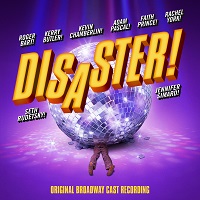 Original Broadway Cast, 2016 (Broadway Records)
Original Broadway Cast, 2016 (Broadway Records)  (4 / 5) As originally presented on the tiny stage of an intimate nightclub on the Upper West Side of Manhattan, Disaster! was a hilariously funny, spot-on spoof of both the epic disaster movies of the 1970s (The Poseidon Adventure, Earthquake, et al.) and the theatrical genre that has come to be known as “the jukebox musical,” in which pre-existing pop songs are shoved willy-nilly into a “plot” written around them. Sadly, the show had a very brief subsequent run on Broadway, where its intentionally bargain-basement production values were apparently not appreciated — this despite a cast that included such adept musical comedians as Roger Bart, Kerry Butler, Kevin Chamberlin, Faith Prince, Rachel York, and the brilliant Jennifer Simard in the scene-stealing role of a nun with a gambling addiction. But if that production couldn’t muster more than 104 performances in total, the cast album provides evidence that the show itself is a laugh riot and would likely be hugely popular with audiences if presented by community, regional, and summer theaters, high schools, and colleges. As set up in the opening number, “Hot Stuff,” the perfectly ridiculous story that Seth Rudetsky, Jack Plotnick, and Drew Geraci concocted to contain dozens of pop hits of the ’70s concerns a professor (Rudetsky) who attempts in vain to warn against an impending earthquake that threatens a floating casino/discotheque. Heard during the course of the loopy proceedings are such deathless songs as “Theme from Mahagony,” “Saturday Night,” “I Am Woman/That’s the Way I’ve Heard it Should Be,” “Never Can Say Goodbye,” “Feelings,” “Three Times a Lady,” “Don’t Cry Out Loud,” and about 20 others — but, cannily, almost none of these are performed complete. Rather, they stick around just long enough to make their comic and nostalgic points, then disappear back into the musical ether. If we can all agree that the highlight of the album is Simard’s magnificently toneless rendition of “The Lord’s Prayer” (remember that one?!), there are many other musically and/or comically excellent tracks here, featuring the personnel named above as well as such other worthies as Adam Pascal, Max Crumm, Manoel Felciano, Lacretta Nicole, Paul Castree, and the budding young talent Baylee Littrell in the dual role of 11-year-old twins Ben and Lisa. Throughout, the sounds of the ’70s are expertly aped by orchestrators/arrangers Joseph Joubert and Seth Rudetsky (wearing yet another hat), vocal arranger Michael McElroy, and dance arranger David Dabbon, all under the crack musical direction of Steve Marzullo. Party on! — Michael Portantiere
(4 / 5) As originally presented on the tiny stage of an intimate nightclub on the Upper West Side of Manhattan, Disaster! was a hilariously funny, spot-on spoof of both the epic disaster movies of the 1970s (The Poseidon Adventure, Earthquake, et al.) and the theatrical genre that has come to be known as “the jukebox musical,” in which pre-existing pop songs are shoved willy-nilly into a “plot” written around them. Sadly, the show had a very brief subsequent run on Broadway, where its intentionally bargain-basement production values were apparently not appreciated — this despite a cast that included such adept musical comedians as Roger Bart, Kerry Butler, Kevin Chamberlin, Faith Prince, Rachel York, and the brilliant Jennifer Simard in the scene-stealing role of a nun with a gambling addiction. But if that production couldn’t muster more than 104 performances in total, the cast album provides evidence that the show itself is a laugh riot and would likely be hugely popular with audiences if presented by community, regional, and summer theaters, high schools, and colleges. As set up in the opening number, “Hot Stuff,” the perfectly ridiculous story that Seth Rudetsky, Jack Plotnick, and Drew Geraci concocted to contain dozens of pop hits of the ’70s concerns a professor (Rudetsky) who attempts in vain to warn against an impending earthquake that threatens a floating casino/discotheque. Heard during the course of the loopy proceedings are such deathless songs as “Theme from Mahagony,” “Saturday Night,” “I Am Woman/That’s the Way I’ve Heard it Should Be,” “Never Can Say Goodbye,” “Feelings,” “Three Times a Lady,” “Don’t Cry Out Loud,” and about 20 others — but, cannily, almost none of these are performed complete. Rather, they stick around just long enough to make their comic and nostalgic points, then disappear back into the musical ether. If we can all agree that the highlight of the album is Simard’s magnificently toneless rendition of “The Lord’s Prayer” (remember that one?!), there are many other musically and/or comically excellent tracks here, featuring the personnel named above as well as such other worthies as Adam Pascal, Max Crumm, Manoel Felciano, Lacretta Nicole, Paul Castree, and the budding young talent Baylee Littrell in the dual role of 11-year-old twins Ben and Lisa. Throughout, the sounds of the ’70s are expertly aped by orchestrators/arrangers Joseph Joubert and Seth Rudetsky (wearing yet another hat), vocal arranger Michael McElroy, and dance arranger David Dabbon, all under the crack musical direction of Steve Marzullo. Party on! — Michael Portantiere
Suffs
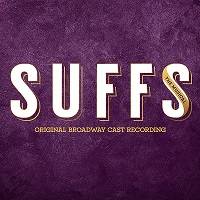 Original Broadway Cast, 2024 (Atlantic)
Original Broadway Cast, 2024 (Atlantic)  (4 / 5) Shaina Taub has previously shown talent and skill in composing scores for and playing featured roles in The Public Theater’s musical adaptations of Shakespeare’s Twelfth Night and As You Like It. With Suffs, Taub has not only written the book, music, and lyrics for the show, but she stars in it as well. This recording showcases her refreshingly intelligent score from start to finish. Songs such as “Worth It” and “This Girl” are not empty ballads; they have lyrics that probe and explore the characters’ thoughts and feelings thoroughly, without a slant rhyme to be heard. The group numbers are equally thrilling as they present the titular “suffs” — suffragists fighting for the voting rights of women from roughly 1913 to 1920. Taub is joined in the all-female cast by Nikki M. James, Jenn Colella, Ally Bonino, Hannah Cruz, Grace McLean, Emily Skinner (somewhat disappointingly underused in two small roles), and too many others to name. James is searing in her first act solo, “Wait My Turn,” and Cruz and Bonino in their featured moments add an endearing quality to the fiery group of women. Grace McLean is perhaps a bit campy while playing President Woodrow Wilson, but does represent a suitably frustrating obstacle for the suffs to overcome. The standout performance on the recording is from Colella as Carrie Catt, a more moderate suffragist who acts as a foil to Shaina Taub’s character, the relentless Alice Paul. Their characters’ vocal slugfest during the convention sequence is musical theater gold. In this age of homogenized vocals and auto-tune, this recording deserves praise for basking in the distinctive and unique voices of its performers. Two quibbles keep the album from being absolutely top-notch. First, the women in the show are so singular in their passion to win the vote that the story and songs fall into a rather predictable pattern. There is a rally, a setback, and then resilience, which leads to another rally, another setback — and so on. Secondly, the fact that there are so many historical figures portrayed in the show means that sometimes the listener is treated to Wikipedia-like summaries of their biographies. But these quibbles aside, Suffs is a highly recommended recording for the merits of its excellent score and stellar cast. — Forrest Hutchinson
(4 / 5) Shaina Taub has previously shown talent and skill in composing scores for and playing featured roles in The Public Theater’s musical adaptations of Shakespeare’s Twelfth Night and As You Like It. With Suffs, Taub has not only written the book, music, and lyrics for the show, but she stars in it as well. This recording showcases her refreshingly intelligent score from start to finish. Songs such as “Worth It” and “This Girl” are not empty ballads; they have lyrics that probe and explore the characters’ thoughts and feelings thoroughly, without a slant rhyme to be heard. The group numbers are equally thrilling as they present the titular “suffs” — suffragists fighting for the voting rights of women from roughly 1913 to 1920. Taub is joined in the all-female cast by Nikki M. James, Jenn Colella, Ally Bonino, Hannah Cruz, Grace McLean, Emily Skinner (somewhat disappointingly underused in two small roles), and too many others to name. James is searing in her first act solo, “Wait My Turn,” and Cruz and Bonino in their featured moments add an endearing quality to the fiery group of women. Grace McLean is perhaps a bit campy while playing President Woodrow Wilson, but does represent a suitably frustrating obstacle for the suffs to overcome. The standout performance on the recording is from Colella as Carrie Catt, a more moderate suffragist who acts as a foil to Shaina Taub’s character, the relentless Alice Paul. Their characters’ vocal slugfest during the convention sequence is musical theater gold. In this age of homogenized vocals and auto-tune, this recording deserves praise for basking in the distinctive and unique voices of its performers. Two quibbles keep the album from being absolutely top-notch. First, the women in the show are so singular in their passion to win the vote that the story and songs fall into a rather predictable pattern. There is a rally, a setback, and then resilience, which leads to another rally, another setback — and so on. Secondly, the fact that there are so many historical figures portrayed in the show means that sometimes the listener is treated to Wikipedia-like summaries of their biographies. But these quibbles aside, Suffs is a highly recommended recording for the merits of its excellent score and stellar cast. — Forrest Hutchinson
Here We Are
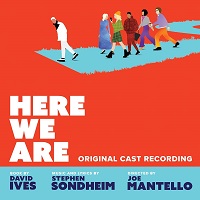 Off-Broadway Cast, 2024 (Concord Theatricals)
Off-Broadway Cast, 2024 (Concord Theatricals)  (4.5 / 5) As staged Off-Broadway at The Shed in late 2023, Sondheim’s final musical — which combines two Luis Buñuel films to create one story about a group of wealthy friends who struggle all day to find a place to eat and then can’t leave the room — offered strange, surreal satisfaction. The cast album of Here We Are captures the show’s bizarreness while still showcasing the small-scale treasures of Sondheim’s last songs. The wise inclusion on the recording of significant patches of David Ives’ book scenes (there is very little music in the second act) helps to capture the show’s shifting flavors, even if parts of the story will likely remain inscrutable to some listeners. Sondheim’s music sometimes goes beyond evoking his past work; certain sections seem to quote Passion and Sunday in the Park with George outright. But there are worse things than revisiting some of his most wistful melodic gestures, and there are moments in this score that suggest a self-referential wink, too. His lyrics remain outstandingly specific to character in their rhythms, vocabulary, and grammar, particularly in the comic “Bishop’s Song” for a character (played by David Hyde Pierce) who would rather be working in another field, and in the show’s most glistening addition to the canon, the aria “Shine” for Marianne (Rachel Bay Jones). “I want things to gleam / To be what they seem / And not what they are,” she sings in one of Sondheim’s last perfect constructions. It’s not his most densely rhymed score, nor his most unimpeachable; for example, a parodically mournful ballad, “It Is What It Is,” for Tracie Bennett (doing a ridiculous French accent), misfires on the recording as it did onstage. But Sondheim clearly relishes the unique weirdnesses of each of his characters, and sometimes gives them notably lush, romantic melodies as in “The Soldier’s Dream,” sung brightly by Jin Ha and Micaela Diamond. (The most frustrating aspect of the album is how often the richest music is interrupted by spoken asides referencing stage business by other characters, doing little to clarify or enrich those moments.) While Here We Are is a true ensemble piece, Jones is especially delightful in animating Marianne’s willful ignorance masquerading as innocence, and lovely as she sounds when singing, it’s the recorded book scenes that demonstrate the complexities she squeezes out of a defiantly superficial character, as when she makes a meal out of delicious consonants in sultry, silly lines such as “I found you a credenza for your embassy.” Perhaps more than anything else, this score in album form is a testament to the 50-year-plus collaboration between orchestrator Jonathan Tunick and Sondheim. The recording not only exquisitely communicates Tunick’s sumptuous, quirky, and always dramatically motivated treatment of Sondheim’s compositions but also demonstrates, through the inclusion of several Act II interludes and the substantial, shimmering exit music, how lovingly Tunick developed those melodies in instrumental sections presumably constructed after Sondheim’s death. (The entr’acte, for instance, fleshes out a gorgeous, brief melody sung by Steven Pasquale in “The Road 4 — Part 2.”) When it comes to that partnership, to quote Marianne, “Don’t we all feel blessed?” — Dan Rubins
(4.5 / 5) As staged Off-Broadway at The Shed in late 2023, Sondheim’s final musical — which combines two Luis Buñuel films to create one story about a group of wealthy friends who struggle all day to find a place to eat and then can’t leave the room — offered strange, surreal satisfaction. The cast album of Here We Are captures the show’s bizarreness while still showcasing the small-scale treasures of Sondheim’s last songs. The wise inclusion on the recording of significant patches of David Ives’ book scenes (there is very little music in the second act) helps to capture the show’s shifting flavors, even if parts of the story will likely remain inscrutable to some listeners. Sondheim’s music sometimes goes beyond evoking his past work; certain sections seem to quote Passion and Sunday in the Park with George outright. But there are worse things than revisiting some of his most wistful melodic gestures, and there are moments in this score that suggest a self-referential wink, too. His lyrics remain outstandingly specific to character in their rhythms, vocabulary, and grammar, particularly in the comic “Bishop’s Song” for a character (played by David Hyde Pierce) who would rather be working in another field, and in the show’s most glistening addition to the canon, the aria “Shine” for Marianne (Rachel Bay Jones). “I want things to gleam / To be what they seem / And not what they are,” she sings in one of Sondheim’s last perfect constructions. It’s not his most densely rhymed score, nor his most unimpeachable; for example, a parodically mournful ballad, “It Is What It Is,” for Tracie Bennett (doing a ridiculous French accent), misfires on the recording as it did onstage. But Sondheim clearly relishes the unique weirdnesses of each of his characters, and sometimes gives them notably lush, romantic melodies as in “The Soldier’s Dream,” sung brightly by Jin Ha and Micaela Diamond. (The most frustrating aspect of the album is how often the richest music is interrupted by spoken asides referencing stage business by other characters, doing little to clarify or enrich those moments.) While Here We Are is a true ensemble piece, Jones is especially delightful in animating Marianne’s willful ignorance masquerading as innocence, and lovely as she sounds when singing, it’s the recorded book scenes that demonstrate the complexities she squeezes out of a defiantly superficial character, as when she makes a meal out of delicious consonants in sultry, silly lines such as “I found you a credenza for your embassy.” Perhaps more than anything else, this score in album form is a testament to the 50-year-plus collaboration between orchestrator Jonathan Tunick and Sondheim. The recording not only exquisitely communicates Tunick’s sumptuous, quirky, and always dramatically motivated treatment of Sondheim’s compositions but also demonstrates, through the inclusion of several Act II interludes and the substantial, shimmering exit music, how lovingly Tunick developed those melodies in instrumental sections presumably constructed after Sondheim’s death. (The entr’acte, for instance, fleshes out a gorgeous, brief melody sung by Steven Pasquale in “The Road 4 — Part 2.”) When it comes to that partnership, to quote Marianne, “Don’t we all feel blessed?” — Dan RubinsThe Outsiders
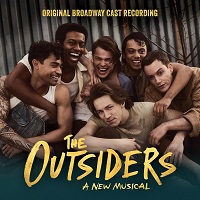 Original Broadway Cast, 2024 (Masterworks Broadway)
Original Broadway Cast, 2024 (Masterworks Broadway)  (3 / 5) The Outsiders followed the popular book-to-movie-to-musical path and arrived on Broadway in 2024. It started out as a novel written by teenage author S.E. Hinton, published in 1967, about two rival groups of teenagers separated by social status — the lower class greasers and the upper class “Socs.” The novel quickly became a staple for high school reading and was further ingrained in American culture via the 1983 Francis Ford Coppola film, with a cast of future stars including Tom Cruise and Rob Lowe. The musical retains much of the novel’s heavy plot and all of its earnestness, with songs by Broadway newcomers Jonathan Clay, Zach Chance, and Justine Levine. While the score pulsates with folk rhythms and country melodies, many of the lyrics are less than adept — for example, “It’s hard to write the story when the story’s writing me,” “It’s Friday night and it feels so right.” The novel was written in the first-person perspective, and the musical’s creators have not found a fully satisfactory way of balancing the exposition from the source material with the necessary dramatic elements required to tell the story on stage and through song. The main protagonist, a 14-year-old named Ponyboy Curtis (played and sung with sensitivity by Brody Grant), is a member of the greasers gang along with Johnny Cade (Sky Lakota Lynch), Sodapop (Jason Schmidt), Dally (Joshua Boone), and Ponyboy’s older brother, Darrel (Brent Comer). Despite violent confrontations between the rival gangs, Ponyboy makes a connection with one of the “Soc” girls, Cherry Valance (Emma Pittman). Refreshingly, though, the show avoids a Romeo and Juliet-like romantic storyline by focusing on the fraternal relationships among the greasers. In addition to the first few numbers being loaded down by exposition delivered directly to the audience, the score sometimes leans towards melodrama (for example, “Death’s at My Door” and “Throwing in the Towel”). But happily, when the conflict between the two gangs escalates, The Outsiders finds its footing and amps up the excitement in songs such as “Justice for Tulsa” and “Trouble.” The Dally character gets two stellar musical moments, the jazzy “Little Brother” and “Run Run Brother,” while the 11 o’clock number, “Stay Gold,” sung by Ponyboy and Johnny Cade, has the show’s most endearing melody, despite a distracting amount of reverb on this recording. All of the songs are aided mightily by Justine Levine’s fantastic orchestrations. — Forrest Hutchison
(3 / 5) The Outsiders followed the popular book-to-movie-to-musical path and arrived on Broadway in 2024. It started out as a novel written by teenage author S.E. Hinton, published in 1967, about two rival groups of teenagers separated by social status — the lower class greasers and the upper class “Socs.” The novel quickly became a staple for high school reading and was further ingrained in American culture via the 1983 Francis Ford Coppola film, with a cast of future stars including Tom Cruise and Rob Lowe. The musical retains much of the novel’s heavy plot and all of its earnestness, with songs by Broadway newcomers Jonathan Clay, Zach Chance, and Justine Levine. While the score pulsates with folk rhythms and country melodies, many of the lyrics are less than adept — for example, “It’s hard to write the story when the story’s writing me,” “It’s Friday night and it feels so right.” The novel was written in the first-person perspective, and the musical’s creators have not found a fully satisfactory way of balancing the exposition from the source material with the necessary dramatic elements required to tell the story on stage and through song. The main protagonist, a 14-year-old named Ponyboy Curtis (played and sung with sensitivity by Brody Grant), is a member of the greasers gang along with Johnny Cade (Sky Lakota Lynch), Sodapop (Jason Schmidt), Dally (Joshua Boone), and Ponyboy’s older brother, Darrel (Brent Comer). Despite violent confrontations between the rival gangs, Ponyboy makes a connection with one of the “Soc” girls, Cherry Valance (Emma Pittman). Refreshingly, though, the show avoids a Romeo and Juliet-like romantic storyline by focusing on the fraternal relationships among the greasers. In addition to the first few numbers being loaded down by exposition delivered directly to the audience, the score sometimes leans towards melodrama (for example, “Death’s at My Door” and “Throwing in the Towel”). But happily, when the conflict between the two gangs escalates, The Outsiders finds its footing and amps up the excitement in songs such as “Justice for Tulsa” and “Trouble.” The Dally character gets two stellar musical moments, the jazzy “Little Brother” and “Run Run Brother,” while the 11 o’clock number, “Stay Gold,” sung by Ponyboy and Johnny Cade, has the show’s most endearing melody, despite a distracting amount of reverb on this recording. All of the songs are aided mightily by Justine Levine’s fantastic orchestrations. — Forrest HutchisonGutenberg! The Musical
 Original Off-Broadway Cast, 2009 (PS Classics)
Original Off-Broadway Cast, 2009 (PS Classics)  (2.5 / 5) Scott Brown and Anthony King developed this two-person comic gem about two composers writing a musical. The fictional writers have created a show portraying Johannes Gutenberg and the invention of the printing press to help a town’s illiterate populace. This recording features in the roles of the two aspiring writers Christopher Fitzgerald as Bud Davenport and Jeremy Shamos as Doug Simon. Bud and Doug are very sincere, but their show is very bad. Nevertheless, they are pitching it to audiences and (they hope) to “famous Broadway producers.” Unfortunately, since this is just a reading and they don’t have a cast yet, Bud and Doug are forced to play all of the parts themselves, including the title role as well as an evil monk, a lovely young woman (aptly named Helvetica), and all of the other various townspeople. This potentially confusing premise is kept afloat by distinctive performances from Fitzgerald and Shamos, who take on unique accents and personas for each of the characters. On stage, the actors would don hats bearing the character names or descriptions to help make it clear to the audience whom they were playing at any given moment, speedily switching from one to another, and while these visual gags can’t be seen on the recording, it’s a credit to the duo that listeners could almost forget that this was a two-person show when listening through the cast album. While the material is enjoyable, it is slight; the comedy is hit-or-miss, and there are crass jokes about dead babies, anti-Semitic flower girls, and even suicide. In the end, the songs most often prompt unfavorable comparisons to other scores: for example, Urinetown comments on itself more cleverly, while [title of show] breaks the fourth wall more effectively. Still, the “plot” of Gutenberg! The Musical is delightfully wacky, crazy enough to keep you laughing but just grounded enough to make you think that someone out there might possibly think the show within this show would be a good idea. — Forrest Hutchinson
(2.5 / 5) Scott Brown and Anthony King developed this two-person comic gem about two composers writing a musical. The fictional writers have created a show portraying Johannes Gutenberg and the invention of the printing press to help a town’s illiterate populace. This recording features in the roles of the two aspiring writers Christopher Fitzgerald as Bud Davenport and Jeremy Shamos as Doug Simon. Bud and Doug are very sincere, but their show is very bad. Nevertheless, they are pitching it to audiences and (they hope) to “famous Broadway producers.” Unfortunately, since this is just a reading and they don’t have a cast yet, Bud and Doug are forced to play all of the parts themselves, including the title role as well as an evil monk, a lovely young woman (aptly named Helvetica), and all of the other various townspeople. This potentially confusing premise is kept afloat by distinctive performances from Fitzgerald and Shamos, who take on unique accents and personas for each of the characters. On stage, the actors would don hats bearing the character names or descriptions to help make it clear to the audience whom they were playing at any given moment, speedily switching from one to another, and while these visual gags can’t be seen on the recording, it’s a credit to the duo that listeners could almost forget that this was a two-person show when listening through the cast album. While the material is enjoyable, it is slight; the comedy is hit-or-miss, and there are crass jokes about dead babies, anti-Semitic flower girls, and even suicide. In the end, the songs most often prompt unfavorable comparisons to other scores: for example, Urinetown comments on itself more cleverly, while [title of show] breaks the fourth wall more effectively. Still, the “plot” of Gutenberg! The Musical is delightfully wacky, crazy enough to keep you laughing but just grounded enough to make you think that someone out there might possibly think the show within this show would be a good idea. — Forrest Hutchinson
 Broadway Cast, 2024 (Broadway Records)
Broadway Cast, 2024 (Broadway Records)  (2 / 5) The first Broadway production of Gutenberg! reunited former Book of Mormon co-stars Andrew Rannells and Josh Gad, giving them another excellent vehicle to showcase their comedic chemistry and range. As is typical when an Off-Broadway show goes to Broadway, there were some things lost, some things gained. This cast album is longer than the Off-Broadway recording, which at 58 minutes in length was already threatening to outwear its welcome. The additional 10 minutes of material to be found here strain a listener’s goodwill. On the other hand, the spoken dialogue that’s included has been cleverly modified to address listeners to the recording rather than live audience members, and the new jokes are mostly an improvement over those in the previous iteration. Most likely, one’s enjoyment of this album will be closely linked to one’s affinity for Rannells and Gad. They are appropriately earnest as Bud and Doug. and fully committed to each of their bit parts. The best songs are Helvetica’s love ballad, “I Can’t Read,” which contains some expert comedy lyrics; the stereotypical Act 1 Finale, “Tomorrow Is Tonight”; and the deliciously evil “Monk With Me.” On Broadway, the show featured different celebrity guest stars at each performance, playing the famous Broadway producer who offers Bud and Doug their Broadway contract. Mel Brooks was chosen to appear in that brief role on the album, and he’s a wonderful choice for it. — F.H.
(2 / 5) The first Broadway production of Gutenberg! reunited former Book of Mormon co-stars Andrew Rannells and Josh Gad, giving them another excellent vehicle to showcase their comedic chemistry and range. As is typical when an Off-Broadway show goes to Broadway, there were some things lost, some things gained. This cast album is longer than the Off-Broadway recording, which at 58 minutes in length was already threatening to outwear its welcome. The additional 10 minutes of material to be found here strain a listener’s goodwill. On the other hand, the spoken dialogue that’s included has been cleverly modified to address listeners to the recording rather than live audience members, and the new jokes are mostly an improvement over those in the previous iteration. Most likely, one’s enjoyment of this album will be closely linked to one’s affinity for Rannells and Gad. They are appropriately earnest as Bud and Doug. and fully committed to each of their bit parts. The best songs are Helvetica’s love ballad, “I Can’t Read,” which contains some expert comedy lyrics; the stereotypical Act 1 Finale, “Tomorrow Is Tonight”; and the deliciously evil “Monk With Me.” On Broadway, the show featured different celebrity guest stars at each performance, playing the famous Broadway producer who offers Bud and Doug their Broadway contract. Mel Brooks was chosen to appear in that brief role on the album, and he’s a wonderful choice for it. — F.H.The Notebook
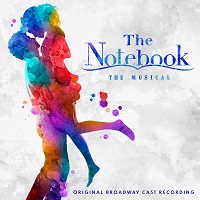 Original Broadway Cast, 2024 (Atlantic)
Original Broadway Cast, 2024 (Atlantic)  (3.5 / 5) The Notebook wears its heart on its sleeve. And why wouldn’t it? From Nicholas Sparks’ novel to Nick Cassavetes’ film to Ingrid Michaelson’s Broadway musical, the story of Noah, a boy from the wrong side of the tracks, and rich girl Allison, who fall in love as teenagers and stay in love for the rest of their lives, has touched people all over the world. The question presented by this cast album is: How many earnest pop ballads about love can fit in one musical? And the answer is, a surprising amount. Michaelson’s music is lush and catchy, and only in the latter part of the score does it begin to feel repetitive. Her lyrics, written more in the pop vein, often deal in false rhymes (“time/mine,” “coin/joy,” etc.), and in doing so, they don’t quite give the ear what it wants. These lyrics also lack some of the specificity that musical theater requires. But where the score comes up short, the wonderful performances of the six leading cast members who play Noah and Allie at three different stages of their lives make up for it. John Cardoza as Young Noah has an especially delightful, buttery voice that lends itself perfectly to Michaelson’s musical style, and the gruff sound of Dorian Harewood as Older Noah provides an excellent contrast to the expansive vocal quality of the four younger performers. One of the album’s greatest losses is Maryann Plunkett’s full performance as Older Allie. Since her character has dementia for the duration of the show, the authors choose not to have her sing until the finale. When Plunkett does sing, and also when she delivers the snippets of dialogue that are included on the recording along the way, she infuses the character with reality, fire, and beauty. Happily, there are plenty of delights even in her absence. If pop artists were still covering songs from musicals, a few numbers in this score could easily be stand-alone hits: “I’ll Leave the Light On,” Middle Noah’s tribute to the lover he’s gone too long without seeing, is deliciously mournful, and “If This Is Love,” Younger Allie’s account of her feelings towards Noah, is an innocent delight. But The Notebook is strongest as a musical theater recording, rather than a pop album, when it deals with more serious topics; “I Want to Go Back,” in which Younger and Middle Allie voice the frustrations of their older counterpart about being forced to stay in a hospital, is likely to give the listener goosebumps with its soaring melody and plaintive lyrics: “Is it time for dinner? / Is it time for forever?” Indeed, any time Noah and Allie sing in harmony across the generations, it’s immensely satisfying to the ear, their voices blending beautifully and hauntingly. These moments of intergenerational connection could’ve been less frequent in order to maximize their impact, but the listener will be grateful for the aural riches that are present. In live performances of The Notebook, the sounds of audience members sniffling, crying, and outright bawling can be heard during the show’s final scenes and even during the curtain calls. Listeners to the cast album may have a similar response, because even if the songwriting isn’t consistently up to par, it’s good enough to deliver a powerful emotional wallop. — Charles Kirsch
(3.5 / 5) The Notebook wears its heart on its sleeve. And why wouldn’t it? From Nicholas Sparks’ novel to Nick Cassavetes’ film to Ingrid Michaelson’s Broadway musical, the story of Noah, a boy from the wrong side of the tracks, and rich girl Allison, who fall in love as teenagers and stay in love for the rest of their lives, has touched people all over the world. The question presented by this cast album is: How many earnest pop ballads about love can fit in one musical? And the answer is, a surprising amount. Michaelson’s music is lush and catchy, and only in the latter part of the score does it begin to feel repetitive. Her lyrics, written more in the pop vein, often deal in false rhymes (“time/mine,” “coin/joy,” etc.), and in doing so, they don’t quite give the ear what it wants. These lyrics also lack some of the specificity that musical theater requires. But where the score comes up short, the wonderful performances of the six leading cast members who play Noah and Allie at three different stages of their lives make up for it. John Cardoza as Young Noah has an especially delightful, buttery voice that lends itself perfectly to Michaelson’s musical style, and the gruff sound of Dorian Harewood as Older Noah provides an excellent contrast to the expansive vocal quality of the four younger performers. One of the album’s greatest losses is Maryann Plunkett’s full performance as Older Allie. Since her character has dementia for the duration of the show, the authors choose not to have her sing until the finale. When Plunkett does sing, and also when she delivers the snippets of dialogue that are included on the recording along the way, she infuses the character with reality, fire, and beauty. Happily, there are plenty of delights even in her absence. If pop artists were still covering songs from musicals, a few numbers in this score could easily be stand-alone hits: “I’ll Leave the Light On,” Middle Noah’s tribute to the lover he’s gone too long without seeing, is deliciously mournful, and “If This Is Love,” Younger Allie’s account of her feelings towards Noah, is an innocent delight. But The Notebook is strongest as a musical theater recording, rather than a pop album, when it deals with more serious topics; “I Want to Go Back,” in which Younger and Middle Allie voice the frustrations of their older counterpart about being forced to stay in a hospital, is likely to give the listener goosebumps with its soaring melody and plaintive lyrics: “Is it time for dinner? / Is it time for forever?” Indeed, any time Noah and Allie sing in harmony across the generations, it’s immensely satisfying to the ear, their voices blending beautifully and hauntingly. These moments of intergenerational connection could’ve been less frequent in order to maximize their impact, but the listener will be grateful for the aural riches that are present. In live performances of The Notebook, the sounds of audience members sniffling, crying, and outright bawling can be heard during the show’s final scenes and even during the curtain calls. Listeners to the cast album may have a similar response, because even if the songwriting isn’t consistently up to par, it’s good enough to deliver a powerful emotional wallop. — Charles Kirsch
Bloody Bloody Andrew Jackson
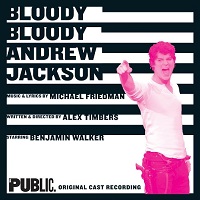 Original Cast, 2010 (Ghostlight)
Original Cast, 2010 (Ghostlight)  (1.5 / 5) Before Hamilton took the world by storm in 2016 with a musical style previously underrepresented on Broadway and a story featuring American historical figures, composer-lyricist Michael Friedman and book writer Alex Timbers utilized similar elements to create Bloody Bloody Andrew Jackson in 2010. The cast album was released following the musical’s successful engagement at The Public Theater and before its disappointing run of 120 performances on Broadway. If the show is certainly no Hamilton, its punk rock score still offers some genuine moments to savor. Take the opening number, “Populism Yea Yea.” Only the most hardened critics could resist banging their heads along to the catchy lyrics. And give a listen to the recording’s final track, “The Hunters of Kentucky,” for another prime example of Friedman’s ability to excite the listener. You won’t have long to wait between those two highlights; the recording is a slight 28 minutes long, making it one of the shortest cast albums ever. Bloody Bloody Andrew Jackson attempts to satirize its title character, played by Benjamin Walker, by portraying him as a foulmouthed, angsty, emo rock star. The idea is to lampoon Jackson’s most controversial decisions and actions by attributing them to his immature, reactive personality, a device that may not register when one is listening to the songs out of context. The score also makes the mistake of glamorizing Jackson’s emotionality as the show goes on, depriving the satire of its bite. Additionally, it should be noted that the original production was widely criticized by Native American activist groups, and subsequent productions have been protested, due to the material’s perceived insensitivity in its depiction of historical events. Comparisons to Hamilton only go so far, given Bloody Bloody Andrew Jackson‘s lack of nuance and the disparity in quality between the two scores. — Forrest Hutchinson
(1.5 / 5) Before Hamilton took the world by storm in 2016 with a musical style previously underrepresented on Broadway and a story featuring American historical figures, composer-lyricist Michael Friedman and book writer Alex Timbers utilized similar elements to create Bloody Bloody Andrew Jackson in 2010. The cast album was released following the musical’s successful engagement at The Public Theater and before its disappointing run of 120 performances on Broadway. If the show is certainly no Hamilton, its punk rock score still offers some genuine moments to savor. Take the opening number, “Populism Yea Yea.” Only the most hardened critics could resist banging their heads along to the catchy lyrics. And give a listen to the recording’s final track, “The Hunters of Kentucky,” for another prime example of Friedman’s ability to excite the listener. You won’t have long to wait between those two highlights; the recording is a slight 28 minutes long, making it one of the shortest cast albums ever. Bloody Bloody Andrew Jackson attempts to satirize its title character, played by Benjamin Walker, by portraying him as a foulmouthed, angsty, emo rock star. The idea is to lampoon Jackson’s most controversial decisions and actions by attributing them to his immature, reactive personality, a device that may not register when one is listening to the songs out of context. The score also makes the mistake of glamorizing Jackson’s emotionality as the show goes on, depriving the satire of its bite. Additionally, it should be noted that the original production was widely criticized by Native American activist groups, and subsequent productions have been protested, due to the material’s perceived insensitivity in its depiction of historical events. Comparisons to Hamilton only go so far, given Bloody Bloody Andrew Jackson‘s lack of nuance and the disparity in quality between the two scores. — Forrest Hutchinson
First Daughter Suite
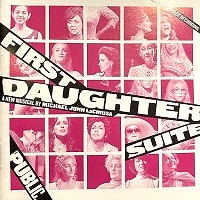 Original Off-Broadway Cast, 2016 (Ghostlight, 2CDs)
Original Off-Broadway Cast, 2016 (Ghostlight, 2CDs)  (4 / 5) One of the great joys of studying and reviewing musical theater cast recordings is tracking the growth and maturity of an artist. Composer-lyricist Michael John LaChuisa has been writing scores for the theater since the 1990s, and his work has continued to develop and expand both musically and dramatically. His score for First Daughter Suite is a high-water mark in both regards. Whereas LaChiusa’s earlier works contained snatches of truncated melodies, this score is full of well-crafted, extended musical sequences. A sort of sequel to of his previous musical First Lady Suite, this one portrays the daughters and wives of American Presidents from both political parties in four separate vignettes. The Nixons, Fords, Carters, Reagans, and Bushes are all present, played by a luminous, uniformly excellent, all-female cast. Barbara Walsh portrays Pat Nixon, Alison Fraser doubles as Betty Ford and Nancy Reagan, and Mary Testa plays Barbara Bush, with Rachel Bay Jones and Caissie Levy doing fine character work in multiple roles. Testa, one of the theater’s most unique treasures, is particularly moving here. LaChiusa wrote his most probing and thought-provoking lyrics for her while searching for any crack in the armor of “Granite Granny” Barbara Bush; in describing the feeling of loss she experienced when her young daughter died of leukemia, Mrs. Bush sings the lyric “losing every atom of myself I thought I had” to heartbreaking effect. First Daughter Suite has been captured in its near entirety on this two-disc recording, which even includes a 22-minute track primarily consisting of dialogue between Alison Fraser’s Nancy Reagan and her estranged daughter, Patti Davis (Levy). Each scene represents not only the personal lives of these people but also marks the progression of America’s views on women during the latter part of the 20th century. If one finds LaChiusa’s early works difficult to enjoy, this score is a perfect opportunity to revisit his music and see how his style has evolved. — Forrest Hutchinson
(4 / 5) One of the great joys of studying and reviewing musical theater cast recordings is tracking the growth and maturity of an artist. Composer-lyricist Michael John LaChuisa has been writing scores for the theater since the 1990s, and his work has continued to develop and expand both musically and dramatically. His score for First Daughter Suite is a high-water mark in both regards. Whereas LaChiusa’s earlier works contained snatches of truncated melodies, this score is full of well-crafted, extended musical sequences. A sort of sequel to of his previous musical First Lady Suite, this one portrays the daughters and wives of American Presidents from both political parties in four separate vignettes. The Nixons, Fords, Carters, Reagans, and Bushes are all present, played by a luminous, uniformly excellent, all-female cast. Barbara Walsh portrays Pat Nixon, Alison Fraser doubles as Betty Ford and Nancy Reagan, and Mary Testa plays Barbara Bush, with Rachel Bay Jones and Caissie Levy doing fine character work in multiple roles. Testa, one of the theater’s most unique treasures, is particularly moving here. LaChiusa wrote his most probing and thought-provoking lyrics for her while searching for any crack in the armor of “Granite Granny” Barbara Bush; in describing the feeling of loss she experienced when her young daughter died of leukemia, Mrs. Bush sings the lyric “losing every atom of myself I thought I had” to heartbreaking effect. First Daughter Suite has been captured in its near entirety on this two-disc recording, which even includes a 22-minute track primarily consisting of dialogue between Alison Fraser’s Nancy Reagan and her estranged daughter, Patti Davis (Levy). Each scene represents not only the personal lives of these people but also marks the progression of America’s views on women during the latter part of the 20th century. If one finds LaChiusa’s early works difficult to enjoy, this score is a perfect opportunity to revisit his music and see how his style has evolved. — Forrest Hutchinson
Something’s Afoot
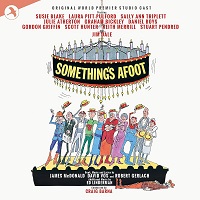 Studio Cast, 2020 (JAY Records)
Studio Cast, 2020 (JAY Records)  (1 / 5) Nearly 50 years after the show’s opening and short-lived stint on Broadway in 1976, this long-awaited studio recording captures the highs and lows of Something’s Afoot, a musical modeled to spoof the stories of Sir Arthur Conan Doyle and Agatha Christie, with particular allusion to Christie’s novel And Then There Were None. The characters, all British stereotypes, are knocked off one by one, and the dialogue on the album does an adequate job of conveying the story beats to the listener. Alas, despite a genre ripe for spoofing, as well as the apparent nostalgia some fans feel for this show, the songs are uninteresting for the most part. Both the music and lyrics are strikingly repetitive, and each song overstays its welcome by a verse or two. The capable cast includes several stage veterans of the West End: Sally Ann Triplett, Laura Pitt-Pulford, Jim Dale, and Susie Blake. They all do their best, but are often forced to resort to over-the-top characterizations in order to sell the mediocre material. Blake plays the show’s primary sleuth, and gets the best songs here. While the score is hardly a rediscovered treasure, other highlights include the jaunty “I Owe It All” and the sweet-sounding but dark finale, “A New Day.” On the other hand, the euphemism-filled “Dinghy” falls completely flat. Those who are already fans of the show from its brief runs on Broadway and then in London will enjoy this recording, but it seems unlikely to win over any new listeners. — Forrest Hutchinson
(1 / 5) Nearly 50 years after the show’s opening and short-lived stint on Broadway in 1976, this long-awaited studio recording captures the highs and lows of Something’s Afoot, a musical modeled to spoof the stories of Sir Arthur Conan Doyle and Agatha Christie, with particular allusion to Christie’s novel And Then There Were None. The characters, all British stereotypes, are knocked off one by one, and the dialogue on the album does an adequate job of conveying the story beats to the listener. Alas, despite a genre ripe for spoofing, as well as the apparent nostalgia some fans feel for this show, the songs are uninteresting for the most part. Both the music and lyrics are strikingly repetitive, and each song overstays its welcome by a verse or two. The capable cast includes several stage veterans of the West End: Sally Ann Triplett, Laura Pitt-Pulford, Jim Dale, and Susie Blake. They all do their best, but are often forced to resort to over-the-top characterizations in order to sell the mediocre material. Blake plays the show’s primary sleuth, and gets the best songs here. While the score is hardly a rediscovered treasure, other highlights include the jaunty “I Owe It All” and the sweet-sounding but dark finale, “A New Day.” On the other hand, the euphemism-filled “Dinghy” falls completely flat. Those who are already fans of the show from its brief runs on Broadway and then in London will enjoy this recording, but it seems unlikely to win over any new listeners. — Forrest Hutchinson
Bernarda Alba
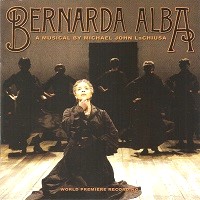 Off-Broadway Cast, 2006 (Ghostlight)
Off-Broadway Cast, 2006 (Ghostlight)  (2.5 / 5) This recording begins with a thrilling and percussive “Prologue” that lays out the haunting story of Bernarda Alba, the recently-widowed mother of five daughters. After her husband’s death, Bernarda refuses to allow any member of her household to leave their home or interact with anyone from the outside world for a set mourning period of eight years. Armed with this concept, the composer, Michael John LaChuisa has packed his score with strong Spanish flamenco beats and rhythms that pay tribute to the source material, Federico Garcia Loca’s drama The House of Bernarda Alba. A strong nod should also be given to Michael Starobin for his fantastic, rhythmic orchestrations throughout the album. But although this musical was certainly an artistic success on stage, it’s difficult to recommend the recording due to LaChiusa’s aversion to melody and song structure. While he has here gifted us with appealing songs such as “Love Let Me Sing You” and “The Smallest Stream,” the bulk of the album is filled with difficult, meandering melodies that hold the listener at arm’s length from what should be a compelling and harrowing story. In the recording’s favor, it does feature Phylicia Rashad as the titular mother. Rashad’s Bernarda is filled with bitterness that has turned to oppressive anger, and she wrings every drop of emotion from the aforementioned “The Smallest Stream.” The rest of the cast of this Lincoln Center Theater production is an abundance of riches, with Saundra Santiago, Judith Blazer, Sally Murphy, Daphne Rubin-Vega, and Nikki M. James as the five daughters. Each of their unique voices are recognizable throughout, but with such an incredible group of performers, it’s a shame they aren’t given more standout material. Overall, this album is not an easy listen; the dark subject matter and complex score make for an intellectually stimulating listening experience, but not always a pleasurable one. — Forrest Hutchinson
(2.5 / 5) This recording begins with a thrilling and percussive “Prologue” that lays out the haunting story of Bernarda Alba, the recently-widowed mother of five daughters. After her husband’s death, Bernarda refuses to allow any member of her household to leave their home or interact with anyone from the outside world for a set mourning period of eight years. Armed with this concept, the composer, Michael John LaChuisa has packed his score with strong Spanish flamenco beats and rhythms that pay tribute to the source material, Federico Garcia Loca’s drama The House of Bernarda Alba. A strong nod should also be given to Michael Starobin for his fantastic, rhythmic orchestrations throughout the album. But although this musical was certainly an artistic success on stage, it’s difficult to recommend the recording due to LaChiusa’s aversion to melody and song structure. While he has here gifted us with appealing songs such as “Love Let Me Sing You” and “The Smallest Stream,” the bulk of the album is filled with difficult, meandering melodies that hold the listener at arm’s length from what should be a compelling and harrowing story. In the recording’s favor, it does feature Phylicia Rashad as the titular mother. Rashad’s Bernarda is filled with bitterness that has turned to oppressive anger, and she wrings every drop of emotion from the aforementioned “The Smallest Stream.” The rest of the cast of this Lincoln Center Theater production is an abundance of riches, with Saundra Santiago, Judith Blazer, Sally Murphy, Daphne Rubin-Vega, and Nikki M. James as the five daughters. Each of their unique voices are recognizable throughout, but with such an incredible group of performers, it’s a shame they aren’t given more standout material. Overall, this album is not an easy listen; the dark subject matter and complex score make for an intellectually stimulating listening experience, but not always a pleasurable one. — Forrest Hutchinson
Big Fish
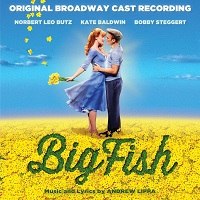 Original Broadway Cast, 2014 (Broadway Records)
Original Broadway Cast, 2014 (Broadway Records)  (3 / 5) Big Fish arrived on Broadway in 2013 with a score by Andrew Lippa and was imaginatively directed by Susan Stroman, but it did not last more than 100 performances. Fortunately, this recording has preserved much of the show’s charm. A strong cast includes Tony Award winner Norbert Leo Butz as Edward Bloom, a yarn-spinning, traveling salesman who dazzles his son, Will (a pleasant-sounding Bobby Steggart), with stories of adventure that stretch the imagination. These oftentimes unbelievable tales strain Edward’s relationship with his son and frustrate his long-suffering wife, played by Kate Baldwin. Butz sounds fantastic throughout; he’s youthful and charming in the opening number, “Be the Hero,” and inspiring in his solo, “Fight the Dragons.” Baldwin’s endearing soprano is much appreciated in softer moments such as the lovely “ I Don’t Need A Roof.” The score culminates with the highly emotional song “How It Ends,” a reconciliation for father and son. Unfortunately, between the effective songs for the main characters, there are several production numbers featuring other characters that do not come across nearly as well on the recording and may serve to make this album a slightly frustrating, but certainly not a profitless, listening experience. — Forrest Hutchinson
(3 / 5) Big Fish arrived on Broadway in 2013 with a score by Andrew Lippa and was imaginatively directed by Susan Stroman, but it did not last more than 100 performances. Fortunately, this recording has preserved much of the show’s charm. A strong cast includes Tony Award winner Norbert Leo Butz as Edward Bloom, a yarn-spinning, traveling salesman who dazzles his son, Will (a pleasant-sounding Bobby Steggart), with stories of adventure that stretch the imagination. These oftentimes unbelievable tales strain Edward’s relationship with his son and frustrate his long-suffering wife, played by Kate Baldwin. Butz sounds fantastic throughout; he’s youthful and charming in the opening number, “Be the Hero,” and inspiring in his solo, “Fight the Dragons.” Baldwin’s endearing soprano is much appreciated in softer moments such as the lovely “ I Don’t Need A Roof.” The score culminates with the highly emotional song “How It Ends,” a reconciliation for father and son. Unfortunately, between the effective songs for the main characters, there are several production numbers featuring other characters that do not come across nearly as well on the recording and may serve to make this album a slightly frustrating, but certainly not a profitless, listening experience. — Forrest Hutchinson
Spongebob Squarepants
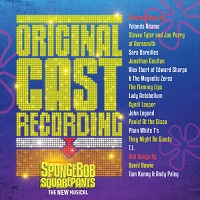 Original Cast, 2017 (Masterworks Broadway)
Original Cast, 2017 (Masterworks Broadway)  (4 / 5) The Spongebob Squarepants album — recorded following the Chicago tryout, before most of the cast transferred to Broadway — succeeds largely through the strange emotive pull it enacts on audiencess who grew up on Nickelodeon. Has there been a more effectively nostalgic musical for the children of the late ’90s? But with a cast digging into impersonations of the TV show’s voice actors, this recording may not have great appeal for Spongebob neophytes. A bevy of songwriters was brought aboard to contribute individual songs to this score, and without director Tina Landau’s unifying stage vision, all of that genre-hopping makes for a bit of a weird listen. (A Cyndi Lauper bop precedes a hymn of praise from gospel artist Yolanda Adams, for example.) But even if the score as a whole feels piecemeal in this context, there are plenty of buoyantly fun tracks on the album. The opening “Bikini Bottom Day,” by Jonathan Coulton, is an especially whimsical earworm with a convincing musical theater structure. Sara Bareilles surprises with a winningly anthemic pirate waltz (“Dentists hate pirate insurance / Which is why we’ve so many gold teeth”), and no less a personage than John Legend provides the show’s only slow ballad, “Miss You,” a sweet duet. Most of the songs for the supporting characters — Carlos López’s Mr. Krabs, Lilli Cooper’s Sandy, and Nick Blaemire’s Plankton — are skippable, while a friendship song for Spongebob and Patrick, “BFF” by Plain White T’s, pales in comparison to a similarly purposed ditty that was introduced on the TV show, “The F.U.N. Song.” But in the titular role, Ethan Slater infuses his uncanny impression with a lovely warmth. Emmy Raver-Lampman also makes a mighty impression as the high-belting whale Pearl. Arranger and orchestrator Tom Kitt is the real MVP of the album, maintaining a joyfully silly tone rooted in musical theater earnestness throughout while surfing musical styles. The score offers lots of auditory in-jokes for Spongebob fans — even the orchestrations and specific instrumentation choices are delightfully referential. And if Spongebob skeptics may be less than fully invested in the storyline, the recording is produced with a glistening mix that makes for a consistently enjoyable listen. — Dan Rubins
(4 / 5) The Spongebob Squarepants album — recorded following the Chicago tryout, before most of the cast transferred to Broadway — succeeds largely through the strange emotive pull it enacts on audiencess who grew up on Nickelodeon. Has there been a more effectively nostalgic musical for the children of the late ’90s? But with a cast digging into impersonations of the TV show’s voice actors, this recording may not have great appeal for Spongebob neophytes. A bevy of songwriters was brought aboard to contribute individual songs to this score, and without director Tina Landau’s unifying stage vision, all of that genre-hopping makes for a bit of a weird listen. (A Cyndi Lauper bop precedes a hymn of praise from gospel artist Yolanda Adams, for example.) But even if the score as a whole feels piecemeal in this context, there are plenty of buoyantly fun tracks on the album. The opening “Bikini Bottom Day,” by Jonathan Coulton, is an especially whimsical earworm with a convincing musical theater structure. Sara Bareilles surprises with a winningly anthemic pirate waltz (“Dentists hate pirate insurance / Which is why we’ve so many gold teeth”), and no less a personage than John Legend provides the show’s only slow ballad, “Miss You,” a sweet duet. Most of the songs for the supporting characters — Carlos López’s Mr. Krabs, Lilli Cooper’s Sandy, and Nick Blaemire’s Plankton — are skippable, while a friendship song for Spongebob and Patrick, “BFF” by Plain White T’s, pales in comparison to a similarly purposed ditty that was introduced on the TV show, “The F.U.N. Song.” But in the titular role, Ethan Slater infuses his uncanny impression with a lovely warmth. Emmy Raver-Lampman also makes a mighty impression as the high-belting whale Pearl. Arranger and orchestrator Tom Kitt is the real MVP of the album, maintaining a joyfully silly tone rooted in musical theater earnestness throughout while surfing musical styles. The score offers lots of auditory in-jokes for Spongebob fans — even the orchestrations and specific instrumentation choices are delightfully referential. And if Spongebob skeptics may be less than fully invested in the storyline, the recording is produced with a glistening mix that makes for a consistently enjoyable listen. — Dan RubinsThe Gardens of Anuncia
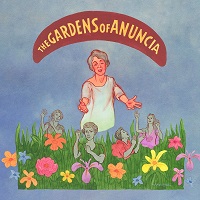 Original Off-Broadway Cast, 2024 (Ghostlight)
Original Off-Broadway Cast, 2024 (Ghostlight)  (4.5 / 5) From the shimmery first notes of The Gardens of Anuncia, listeners will get the feeling they’re entering a magical land. What follows is a gem of a show that tells the story of the upbringing of the great Broadway choreographer Graciela Daniele. (The character here closely based on Daniele is known as Anuncia.) The roles of the three women who raised Daniele, known as “Mami,” “Grandmama,” and “Tia,” are brought to vivid life by Michael John LaChiusa’s extravagant melodies and precise lyrics, and the performers of these roles provide the listener with great gifts: the soaring vocals of Eden Espinosa (Mami), the undeniable charm of Andrea Burns (Tia), and the singular combination of brashness and heart possessed by Mary Testa as Grandmama. (Who else could bring you to the verge of tears with the lyrics “Eat your macaroni!/I don’t want you to be hungry?”) The title role is played dually by Priscilla Lopez, who provides the proper serenity and charm in narrating the show as the older Anuncia, and Kalyn West, who does an admirable job as the innocent, young version of the character, being taught the ways of the world by her three female mentors. The show risks feeling saccharine towards the beginning, as most of the early songs are simply depictions of the happy lives of the four women. But the music is never uninteresting — listeners should not be surprised if they find themselves humming the opening refrain about “Mami, Grandmama, Tia, and me.” The show takes a sharp left turn once Anuncia’s mother is taken as a political prisoner; in “The Vigil,” LaChiusa’s haunting music does justice to the confusion and anxiety every member of the family must have felt during that difficult time. And in “The Story of That Man,” Anuncia stops serving as a secondary character to the women who raised her, coming to the forefront as she shares the traumatic and limited memories she has of her father. Lovely diversions from these more serious moments are provided by two singing deer, both played by Tally Sessions, who appear in the older Anuncia’s garden to impart an important life lesson: “Dance while you can.” Sessions brings a vaudevillian touch to the proceedings, and these numbers brilliantly fit with the rest of the score despite their surface silliness. This show never feels like a vanity project, but Daniele’s ultimate mission in creating it is clear throughout: To give the three strong women who raised her their due. That goal is accomplished with special beauty in the finale, “Never a Goodbye,” in which older Anuncia finally buries the ashes of her aunt. Considering this recording’s many delights, no listener will be sorry that they let LaChiusa and Daniele lead them down this garden path. — Charles Kirsch
(4.5 / 5) From the shimmery first notes of The Gardens of Anuncia, listeners will get the feeling they’re entering a magical land. What follows is a gem of a show that tells the story of the upbringing of the great Broadway choreographer Graciela Daniele. (The character here closely based on Daniele is known as Anuncia.) The roles of the three women who raised Daniele, known as “Mami,” “Grandmama,” and “Tia,” are brought to vivid life by Michael John LaChiusa’s extravagant melodies and precise lyrics, and the performers of these roles provide the listener with great gifts: the soaring vocals of Eden Espinosa (Mami), the undeniable charm of Andrea Burns (Tia), and the singular combination of brashness and heart possessed by Mary Testa as Grandmama. (Who else could bring you to the verge of tears with the lyrics “Eat your macaroni!/I don’t want you to be hungry?”) The title role is played dually by Priscilla Lopez, who provides the proper serenity and charm in narrating the show as the older Anuncia, and Kalyn West, who does an admirable job as the innocent, young version of the character, being taught the ways of the world by her three female mentors. The show risks feeling saccharine towards the beginning, as most of the early songs are simply depictions of the happy lives of the four women. But the music is never uninteresting — listeners should not be surprised if they find themselves humming the opening refrain about “Mami, Grandmama, Tia, and me.” The show takes a sharp left turn once Anuncia’s mother is taken as a political prisoner; in “The Vigil,” LaChiusa’s haunting music does justice to the confusion and anxiety every member of the family must have felt during that difficult time. And in “The Story of That Man,” Anuncia stops serving as a secondary character to the women who raised her, coming to the forefront as she shares the traumatic and limited memories she has of her father. Lovely diversions from these more serious moments are provided by two singing deer, both played by Tally Sessions, who appear in the older Anuncia’s garden to impart an important life lesson: “Dance while you can.” Sessions brings a vaudevillian touch to the proceedings, and these numbers brilliantly fit with the rest of the score despite their surface silliness. This show never feels like a vanity project, but Daniele’s ultimate mission in creating it is clear throughout: To give the three strong women who raised her their due. That goal is accomplished with special beauty in the finale, “Never a Goodbye,” in which older Anuncia finally buries the ashes of her aunt. Considering this recording’s many delights, no listener will be sorry that they let LaChiusa and Daniele lead them down this garden path. — Charles Kirsch
Little Women
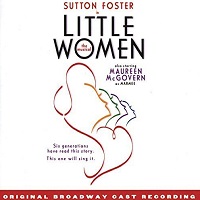 Original Broadway Cast, 2005 (Ghostlight) No stars; not recommended. Among the most distressing of all musicals are those adaptations of classic literature that are very poorly crafted but achieve some significant degree of success regardless, because the characters and storytelling of the source material are so beloved as to ensure the musical will garner fans who are not sensitive to the fact that the score is second-, third-, or even fourth-rate. One prime example is Little Women, with music by Jason Howland, lyrics by Mindi Dickstein, and a book by Allan Knee. Although this show inspired by Louisa May Alcott’s novel had only a four-month run on Broadway, it has been frequently produced regionally on both the professional and amateur levels — never mind that the score is serviceable at best and deplorable at worst. Howland’s music is generic, derivative, and exhibits no sense of period style, while Dickstein’s lyrics are prosaic and obvious. One of the most egregious songs to be found here is “Astonishing,” so ineptly written that the one-word title, repeated many times throughout the lyric, is annoyingly set with the accent on the wrong syllable (the final one, rather than the second one). In the role of Jo, Sutton Foster offers renditions of this and other songs marked by the sort of extremely unpleasant, pinched, high belting that tends to cause young female audiences to scream approval but is nevertheless a blight on the musical theater. The lovely voices of Danny Gurwin as Laurie, John Weitzer as John Brooke, and especially the great Maureen McGovern as Marmee provide some respite from all that’s going on around them, but given the generally very low quality of the material that they too are given to sing, their contributions are not enough to make this recording worthwhile. The same can be said for the singers heard here in the roles of the other “little women” — Amy McAlexander as Amy, Megan McGinnis as Beth, Jenny Powers as Meg — who fail to make much of an impression because they have comparatively little to do. According to the nervy marketing blurb on the cast album cover, “Six generations have read this story. This one will sing it.” As was the case with the infamous Cats catch phrase “Now and forever,” one wonders if that’s meant as a promise, a threat, or an ultimatum. — Michael Portantiere
Original Broadway Cast, 2005 (Ghostlight) No stars; not recommended. Among the most distressing of all musicals are those adaptations of classic literature that are very poorly crafted but achieve some significant degree of success regardless, because the characters and storytelling of the source material are so beloved as to ensure the musical will garner fans who are not sensitive to the fact that the score is second-, third-, or even fourth-rate. One prime example is Little Women, with music by Jason Howland, lyrics by Mindi Dickstein, and a book by Allan Knee. Although this show inspired by Louisa May Alcott’s novel had only a four-month run on Broadway, it has been frequently produced regionally on both the professional and amateur levels — never mind that the score is serviceable at best and deplorable at worst. Howland’s music is generic, derivative, and exhibits no sense of period style, while Dickstein’s lyrics are prosaic and obvious. One of the most egregious songs to be found here is “Astonishing,” so ineptly written that the one-word title, repeated many times throughout the lyric, is annoyingly set with the accent on the wrong syllable (the final one, rather than the second one). In the role of Jo, Sutton Foster offers renditions of this and other songs marked by the sort of extremely unpleasant, pinched, high belting that tends to cause young female audiences to scream approval but is nevertheless a blight on the musical theater. The lovely voices of Danny Gurwin as Laurie, John Weitzer as John Brooke, and especially the great Maureen McGovern as Marmee provide some respite from all that’s going on around them, but given the generally very low quality of the material that they too are given to sing, their contributions are not enough to make this recording worthwhile. The same can be said for the singers heard here in the roles of the other “little women” — Amy McAlexander as Amy, Megan McGinnis as Beth, Jenny Powers as Meg — who fail to make much of an impression because they have comparatively little to do. According to the nervy marketing blurb on the cast album cover, “Six generations have read this story. This one will sing it.” As was the case with the infamous Cats catch phrase “Now and forever,” one wonders if that’s meant as a promise, a threat, or an ultimatum. — Michael Portantiere
I Can’t Keep Running in Place
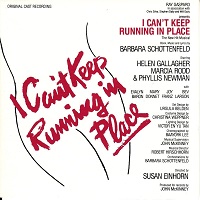 Original Off-Broadway Cast, 1981 (Painted Smiles)
Original Off-Broadway Cast, 1981 (Painted Smiles)  (1 / 5) This musical about a six-week women’s assertiveness training workshop came across as little more than an audition piece for Barbara Schottenfeld, who wrote the book, music, and lyrics. The songs are decent enough, sincere and spirited, even if the music disappears from your mind the moment after you’ve heard it. But the book just isn’t there, and the characters are minimally delineated: the rich and acerbic one, the fat one, the smug student, the doormat, and so on. They occasionally take part in telephone conversations about husbands and children, but mostly they sing one song after another. As performed by Helen Gallagher, Joy Franz, Evalyn Baron, Phyllis Newman, and especially Marcia Rodd in the role of the troubled therapists, the musical numbers are momentarily effective but, without plot or characters to back them up, they’re out there on their own — David Wolf
(1 / 5) This musical about a six-week women’s assertiveness training workshop came across as little more than an audition piece for Barbara Schottenfeld, who wrote the book, music, and lyrics. The songs are decent enough, sincere and spirited, even if the music disappears from your mind the moment after you’ve heard it. But the book just isn’t there, and the characters are minimally delineated: the rich and acerbic one, the fat one, the smug student, the doormat, and so on. They occasionally take part in telephone conversations about husbands and children, but mostly they sing one song after another. As performed by Helen Gallagher, Joy Franz, Evalyn Baron, Phyllis Newman, and especially Marcia Rodd in the role of the troubled therapists, the musical numbers are momentarily effective but, without plot or characters to back them up, they’re out there on their own — David Wolf
Man in the Moon
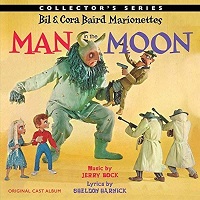 Original Broadway Cast, 1963 (Golden Records/no CD)
Original Broadway Cast, 1963 (Golden Records/no CD)  (2 / 5) The puppets of Bil and Cora Baird were all over early television, as well as being featured in the Broadway musical Flahooley and the film version of The Sound of Music. In the 1960s, Bil Baird attempted a series of theatrical musicals for kids. Some of them were performed in his Greenwich Village jewel box theater, but Man in the Moon actually played on Broadway. The director was Gerald Freedman, the book was written by Arthur Burns (based on a story by Baird), and the songs were by composer Jerry Bock and lyricist Sheldon Harnick. They wrote five numbers for this one-act musical, all of them modest but delightful. (The second acts of Baird’s shows were puppet revues.) In one of the songs, “I Got an Itch,” the gangster-villain sings about having “an itch for a rich, ripe rube I can rob” and tells us that “When night-time comes a-stealing, so do I.” The plot centers on a young boy who goes to the moon by riding a moonbeam but doesn’t realize that gangsters on the lam are right behind him. The gangsters are defeated, and everyone leaves happy — except for Bock and Harnick’s numerous fans, who can’t help thinking about all of the other wonderful shows they might have written as a team if The Rothschilds hadn’t marked their last time working together. — David Wolf
(2 / 5) The puppets of Bil and Cora Baird were all over early television, as well as being featured in the Broadway musical Flahooley and the film version of The Sound of Music. In the 1960s, Bil Baird attempted a series of theatrical musicals for kids. Some of them were performed in his Greenwich Village jewel box theater, but Man in the Moon actually played on Broadway. The director was Gerald Freedman, the book was written by Arthur Burns (based on a story by Baird), and the songs were by composer Jerry Bock and lyricist Sheldon Harnick. They wrote five numbers for this one-act musical, all of them modest but delightful. (The second acts of Baird’s shows were puppet revues.) In one of the songs, “I Got an Itch,” the gangster-villain sings about having “an itch for a rich, ripe rube I can rob” and tells us that “When night-time comes a-stealing, so do I.” The plot centers on a young boy who goes to the moon by riding a moonbeam but doesn’t realize that gangsters on the lam are right behind him. The gangsters are defeated, and everyone leaves happy — except for Bock and Harnick’s numerous fans, who can’t help thinking about all of the other wonderful shows they might have written as a team if The Rothschilds hadn’t marked their last time working together. — David Wolf

